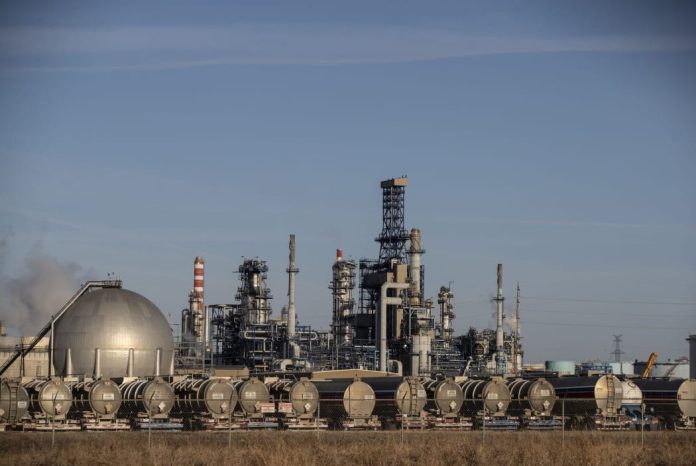The cheap Canadian oil America craves is becoming a key bargaining chip in President Trump’s threatened trade war.
The countries’ energy markets have grown increasingly intertwined in recent decades, with multibillion-dollar pipelines and sprawling refineries built for Canadians to funnel stateside the tar-like crude from booming oil fields in Alberta. Surging trade has driven down prices at the pump in the Midwest and helped transform the Gulf Coast into a global export hub.
But Trump has already jolted that relationship, promising 25% tariffs on all imports from Canada and directing federal agencies to re-evaluate trade policies with countries including America’s most important foreign oil supplier.
“I think we’ll do it Feb. 1,” Trump said of imposing tariffs, speaking in the Oval Office Monday night.
The specter of tariffs on Canada’s energy-dependent economy has left officials from Ottawa to provincial power centers scrambling. Even if crude ends up exempt, the Canadian government is considering retaliation that could ensnare oil shipments.
Jonathan Wilkinson, Canada’s minister of energy and natural resources, said in an interview that he would prefer “less confrontational” responses such as taxes on the country’s oil exports. But he didn’t rule out an extreme measure in the event of escalation: restricting shipments to the U.S.
At a news conference Tuesday, Smith urged Canada to ramp up border security and buy more U.S. goods in the hope of avoiding a trade war, rather than threaten retaliation that could curb Americans’ energy supplies.
“I don’t know that this particular administration—this particular president—responds well to threats, especially empty threats,” said Smith, who has proposed doubling Alberta’s oil production.
If enacted, the effective tax on imported Canadian oil could yield more than $20 billion a year based on current trade flows and prices.
“We don’t need their oil and gas. We don’t need anything they have,” Trump said earlier this month.
Trump has also threatened to put tariffs on imports from Mexico, America’s second-largest supplier of foreign oil, a move that analysts say would tighten the market further. A White House spokeswoman didn’t respond to a request for comment.
Canadian producers shipped about four million barrels of oil a day stateside in the first 10 months of 2024, according to federal data, roughly double 2010 levels. Supplies from north of the border accounted for more than 60% of the crude Americans bought from abroad in 2024.
Those shipments are well-suited for the massive U.S. fuel-making industry. While America’s hottest oil field in West Texas and New Mexico pumps out light, sweet crude, Alberta’s oil sands produce the heavier oil that American refineries are largely designed to use.
The imports also come at a bargain. Canadian oil typically trades at a 15%-or-more discount to American crude to account for transport costs, differences in quality and a limited pool of buyers. That translates to billions in additional annual profits for U.S. fuel makers, according to a 2021 report commissioned by the American Petroleum Institute.
Tariffs on those shipments are “not my preferred route, but the product will flow,” Greg Ebel, chief executive of North American pipeline giant Enbridge, said at an event this month announcing a plan to ship more oil from Alberta to the U.S.
Wilkinson, the Canadian cabinet minister, warned that gasoline prices in the Midwest could rise by as much as 75 cents a gallon should tariffs take effect. Other projections are less extreme. The discount on Canadian oil in futures markets grew slightly last week, suggesting that investors believe producers there would eat at least some of the cost.
The impact on Americans would ultimately hinge on whether U.S. refiners are able to run more domestic crude, according to a report by the Canadian Global Affairs Institute. That could require costly investments to retool facilities.
Higher demand for American oil could theoretically entice U.S. producers to pump more. But Wall Street has increasingly cracked down on drillers’ spendthrift growth plans.
If U.S. producers increase spending to grab market share from their Canadian counterparts, shareholders “are going to scream bloody murder,” said Cole Smead, CEO of Smead Capital Management. “‘Drill, baby, drill’ should be a swear word.”





